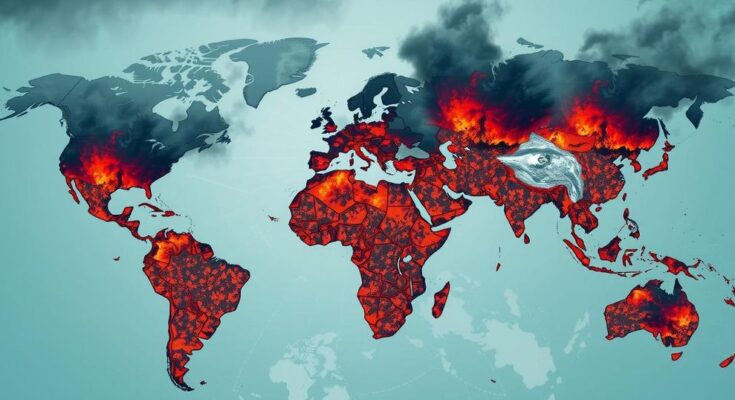The year 2024 recorded extreme weather events, including a historic rainfall in Dubai and major floods in Spain, marking it among the hottest years on record alongside 2023. Climate change is believed to have intensified these events making them more likely and severe. The need for robust warning systems and community preparedness has become apparent, as billions are impacted by such disasters. Achieving climate resilience must be a priority moving forward.
The year 2024 is poised to be remembered as a turning point in the discourse surrounding climate change, as it matched 2023 as one of the hottest years on record. A multitude of extreme weather conditions globally, such as the unprecedented rainfall in Dubai and catastrophic floods in Spain, have prompted urgent discussions regarding climate resilience. The influential El Niño phenomenon was observed to exacerbate these weather extremes, but scientists attribute notable intensification directly to human-induced climate change, with rainfall events becoming significantly more probable and intense compared to pre-industrial times.
The effects of these weather events were felt by billions, highlighting the dire need for improvements in forecasting and community preparedness to alleviate future disasters. According to an extensive study led by Dr. Wenxia Zhang and her team, extraordinary precipitation events occurred across various regions, revealing vulnerabilities in current weather warning systems. For example, Spain recorded its national rain record of 772 millimeters in just 14 hours, illustrating the volatility of extreme weather occurrences. This dissonance between forecasting accuracy and community readiness often results in devastating consequences, particularly in areas with limited resilience against changing climatic conditions.
The persistence of droughts in some regions starkly contrasted with excessive flooding in others, underscoring the unpredictability of climate impacts. Researchers discovered that rapid transitions between severe droughts and torrential rains present enormous challenges for local communities in terms of adaptation and disaster response. This is evident from the damage inflicted by Hurricane Milton in Florida, which became one of the deadliest hurricanes on record, and the failing canal system in Panama which suffered from crippling low water levels, significantly disrupting global shipping.
Ultimately, the findings attest to the pressing need for a holistic response strategy that incorporates climate science into practical solutions for community preparedness. The study advocates for more effective early warning systems that not only disseminate critical information but also empower residents to act swiftly, ensuring minimized losses due to future climate-related disasters. Overall, the catastrophic events of 2024 alert the global community to the urgency of addressing climate resilience and preparedness, as such extremes are expected to escalate with ongoing climate change.
The context for this analysis emerges from the ongoing and intensifying discourse regarding the impacts of climate change on global weather systems. The year 2024 has seen dramatic extremes in weather patterns, paralleling trends observed in 2023. As the frequency and severity of such events increase, the interaction between natural phenomena such as El Niño and anthropogenic climate change becomes ever more critical. This complex relationship necessitates urgent adaptation strategies and enhanced forecasting capabilities to mitigate the consequences of future disasters. Historical seasonal data has revealed increasing volatility in weather events, prompting scientists to investigate the resilience of communities against these dangers.
In conclusion, 2024 serves as a stark reminder of the challenges posed by climate change, with extreme weather events increasingly affecting global populations. The critical revelations from scientific analyses stress the need for improved prediction and response mechanisms to enhance community preparedness. As weather anomalies become more commonplace, it is essential that nations adopt comprehensive climate adaptation strategies that integrate scientific knowledge with actionable community resilience plans. The future may hold more extremes, and addressing these issues is imperative.
Original Source: studyfinds.org




